|
|
|
Sort Order |
|
|
|
Items / Page
|
|
|
|
|
|
|
| Srl | Item |
| 1 |
ID:
113976
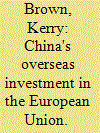

|
|
|
|
|
| Publication |
2012.
|
| Summary/Abstract |
Chinese overseas investment is a new, and growing phenomenon. In the last decade, there have been exponential increases in how much direct investment is flowing from China, particularly into the resource sector. As the eurozone crisis has deepened since 2008, there has been continuing talk by political and business leaders of investment in Europe being a key target for Chinese companies. And yet, the amounts invested so far come to less than 5 percent of China's global overseas foreign direct investment (FDI) total. In the crucial determinants of Chinese FDI, the EU ranks low. There is therefore a good structural reason why, despite the ambitious talk of the Chinese coming to invest more in vital sectors in the EU, this is not happening at the moment and is not likely to happen until China develops into a middle income, more developed economy.
|
|
|
|
|
|
|
|
|
|
|
|
|
|
|
|
| 2 |
ID:
113973
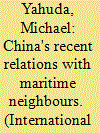

|
|
|
|
|
| Publication |
2012.
|
| Summary/Abstract |
Chinese maritime assertiveness since 2008 is a product of China's growing economic and military power combined with a centrally fostered nationalism. Although incidents with several maritime neighbours may not have all been initiated by China, the Chinese over-reacted. Matters were made worse by the opacity of Chinese decision-making processes and by problems of governance as shown by the multiplicity of Chinese authorities in charge of separate naval forces. The American 'pivot' to Asia provides neighbours with a hedge against an overbearing China, but they still need to cultivate relations with China on whom they are economically dependent.
|
|
|
|
|
|
|
|
|
|
|
|
|
|
|
|
| 3 |
ID:
113974
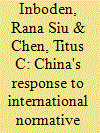

|
|
|
|
|
| Publication |
2012.
|
| Summary/Abstract |
Over the past three decades, the People's Republic of China's response to international human rights pressure has been guided by its strong state identity, an identity that has prioritised the pursuit of economic productivity, material power and international prestige. The goal of a strong socialist state led Beijing to participate in the UN human rights regime for strategic and diplomatic gains, and later to endorse human rights norms that were perceived as consistent with them. Accordingly, the PRC sees colonialism, imperialism, hegemonism, and racism as key human rights violations, while opposing the universality of human rights and rejecting intrusive human rights monitoring, deemed as detrimental to its strong state goal. After the 1989 Tiananmen Square protests, China faced unprecedented international pressure and responded by challenging aspects of the human rights system. During negotiations to replace the UN Commission on Human Rights with the Human Rights Council, China again sought to shield itself from human rights pressure, primarily by challenging country specific approaches. Thus, instead of the normative influence leading to norm-compliant behaviour, China has sought to diminish human rights pressure and shape international human rights institutions in ways that are advantageous to its state interests.
|
|
|
|
|
|
|
|
|
|
|
|
|
|
|
|
| 4 |
ID:
113972
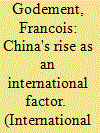

|
|
|
|
|
| Publication |
2012.
|
| Summary/Abstract |
The term 'peaceful development' has created ambiguity. It fails to capture the extent to which China has become a global influence whose economic policy decisions are essential to the world multilateral system. China's international strategy can no longer be guided only by the quest for 'stability' and by the principle of non-interference, because change and interdependence are a hallmark of this century. Neither can a relationship with the United States alone define China's international strategy. Hopefully, China will understand the usefulness for rising powers of making long-lasting compromises, and it will strengthen instead of weaken a set of international institutions that have allowed for the most prosperous and peaceful era in human history.
|
|
|
|
|
|
|
|
|
|
|
|
|
|
|
|
| 5 |
ID:
113975
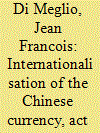

|
|
|
|
|
| Publication |
2012.
|
| Summary/Abstract |
After two waves of important changes in the Chinese system of foreign exchange, one in July 2005, when the Chinese currency was allowed to fluctuate more widely against the US dollar, the other in June 2010, when it was then quoted against an undisclosed basket of currencies, but moreover, was allowed to be partially traded in Hong Kong with the invention of a 'twin', the 'offshore yuan' (CNH), a deep reform could have taken place. The creation of the CNH, allowing debt to be issued internationally in yuan, initially led to the belief that a real set of deep reforms was under way. Yet, like some reforms of the past, which were hesitant or even annulled, the path towards monetary and financial reform is encountering difficulty. The steps taken towards the 'regionalisation' or possibly the 'internationalisation' of the Chinese currency may well be taking the same route. Before the reforms have had time to come to fruition and deliver deep changes, there seems to be some indecisiveness, a sense of relative failure, or at least discovery of the limitations in a process which many, at least at the beginning, believed would be quick and decisive. This article attempts to demonstrate that, like some other Chinese reform processes of the past, the path is not yet very clear and claims of deep changes and unwavering success would be largely premature.
|
|
|
|
|
|
|
|
|
|
|
|
|
|
|
|
| 6 |
ID:
113970
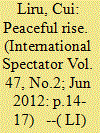

|
|
|
|
|
| Publication |
2012.
|
| Summary/Abstract |
China intends to realise its national resurgence and modernisation through a peaceful path by integrating into or accepting and participating in the existing international system. With reform and opening up as its hallmark, China's growth model is in a sense a marriage between Oriental and Occidental civilisations in the age of globalisation. Openness and inclusiveness are the intrinsic attributes of this model. China's diplomacy since 1978 is essentially an extension of the national modernisation drive, its chief task, basic policies and behavioural patterns being the creation of an international environment conducive to this endeavour.
|
|
|
|
|
|
|
|
|
|
|
|
|
|
|
|
| 7 |
ID:
113977


|
|
|
|
|
| Publication |
2012.
|
| Summary/Abstract |
Sino-Italian bilateral relations are eminently economic in their focus, with trade and investments working as the main drivers of engagement. Two distinctive features have marked economic interaction in recent years: a pattern of asymmetrical competition, and an asynchrony of opportunities in bilateral trade and investment flows. Between 2009 and 2011, however, Sino-Italian relations underwent important changes. Against the background of the global financial crisis, China might become a key source of foreign investments for Italy. In addition, China's efforts to promote domestic demand under the twelfth Five-Year Plan might create unprecedented opportunities for Italian exports.
|
|
|
|
|
|
|
|
|
|
|
|
|
|
|
|
| 8 |
ID:
113971


|
|
|
|
|
| Publication |
2012.
|
| Summary/Abstract |
China's modernisation mission is enduring but there continues to be a large mismatch in China's view of the world and how the world views China. This rejoinder questions China's commitment to political reform, discusses the economic challenges facing China and wonders whether there is a distinct and unique China growth model. Assessing China's impact as a rising power on the international system, it critiques China's global diplomacy and the future of US-China relations. The rejoinder is more circumspect on these issues than Cui's original article.
|
|
|
|
|
|
|
|
|
|
|
|
|
|
|
|
|
|
|
|
|